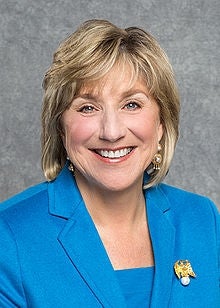The Massachusetts House and Senate on Thursday reached an agreement on legislation to ensure that men and women are paid the same for comparable work, a bill identified by Gov. Charlie Baker as one of six major bills he’s hoping lawmakers will send to his desk before formal sessions end July 31.
The compromise legislation most closely resembles the version approved unanimously last week by the House, which business organizations like Associated Industries of Massachusetts (AIM) and the Massachusetts Business Roundtable had supported, House and Senate officials said.
“The spirit and sense of what was proposed in the Senate is still there. The House worked closely with AIM and the people over there to make sure that the details reflected their concerns,” House Speaker Pro Tempore Patricia Haddad told the News Service. “I don’t think anybody ever in the entire process was against pay equity, it’s always that the devil is in the details.”
Sen. Karen Spilka, who co-sponsored the bill that the Senate passed unanimously in January, said the agreement was not a difficult one to reach since the differences between the bills were fairly small.
“The House version closely mirrors the original Senate bill with three or four changes,” she said. “So it was not a long stretch for us to agree.”
The bill (S 2119) prohibits discrimination on the basis of gender in the payment of wages for comparable work “unless the variation is based upon a mitigating factor” including seniority, education, training, experience, or a bona fide merit system like one that measures earnings by sales, according to Haddad.
“It’s not rocket science, there are not a lot of new concepts,” Spilka said. “We’re putting together, in a more clearly defined and expressly defined bill, a lot of what people have been talking about as necessary to end the gender pay gap.”
A study from the Institute for Women’s Policy Research reported earlier this year that the state’s earnings ratio placed Massachusetts in 18th place nationally for pay equity and, without changes, the state’s wage gap is expected to persist until 2058.
“I am so happy for my granddaughters, who will enter a much fairer workforce and won’t have to battle the same gender wage gap that has held back women’s salaries for too long,” Sen. Patricia Jehlen, who has filed pay equity bills in numerous sessions, said in a statement.
The compromise contains a Senate-backed provision that forbids businesses from requiring a job applicant disclose their previous salary history, though the employer may inquire about previous salaries after making a job and compensation offer to the prospective employee.
The legislation encourages businesses to evaluate their own pay practices and would allow self-evaluations to be used as an affirmative defense in a pay discrimination claim, if they were conducted within the previous three years and the employer could demonstrate “reasonable progress” toward closing pay differentials. The evaluation and any steps taken to close a gap could not be used as evidence of a violation of pay equity.
“I think it was a win-win for both sides because businesses were able to redefine things that were sort of vague and I think we went very far in being able to allow women to now have a level playing field when they go for a job,” Haddad said.
The branches agreed to the new version of the bill Thursday without sending differing bills to a conference committee for resolution. The agreement was reached without debate and advanced on voice votes during lightly attended informal sessions.
The final votes — on enactment of the compromise bill — are expected Saturday, when both branches plan to meet in full formal sessions between the Republican and Democratic national party conventions.
Equal pay bills stalled on Beacon Hill in previous sessions, and both Haddad and Spilka said the effort was successful this session because everyone involved devoted time and effort to it.
“All four entities — the governor recognized it as important, the attorney general put in the work and the Senate president and speaker — identified it as something that has been around for too long and we needed to really do something about it,” Haddad said. “Sometimes it just takes a number of people saying, ‘we’re going to put in the work and get it done.'”
Spilka said, “Sometimes it takes a little while to build the critical mass and make sure we have strong consensus. That’s what we did this session.”

